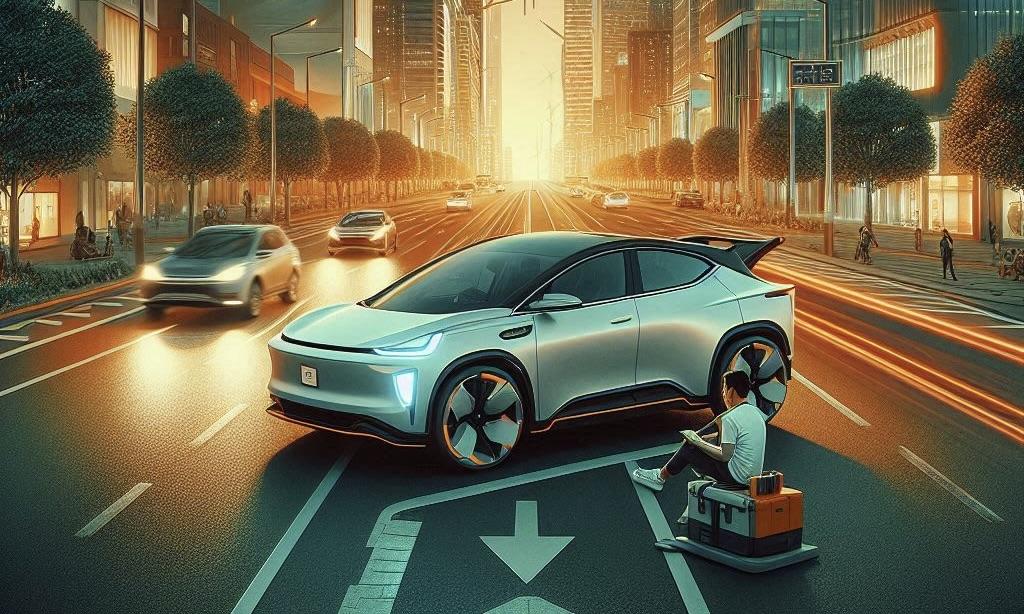Amid challenging market conditions and component shortages, Rivian aims to post its first gross profit in Q4, driven by cost-saving strategies and rising green credit sales. The company, which saw a revenue drop in Q3, is focused on meeting delivery targets and securing a profitable path forward.
Rivian Boosts Green Credit Sales and Cuts Costs to Tackle High EV Market Expenses
Despite component scarcity disrupting production and lackluster EV demand, Rivian announced on November 7 that it was on course to earn a gross profit in the fourth quarter, boosted by cost reductions and a strong increase in green car credit sales, per Reuters.
Investor concerns about Rivian's first quarterly revenue decline since going public three years ago were allayed on Thursday when the company reiterated the projection for full-year deliveries.
After hours, Rivian's stock was up almost 2%. Additionally, the business anticipates reporting a gross profit each year in 2025.
Regulatory credit sales were projected to reach over $300 million this year and next, a significant increase from the $73 million recorded in 2023.
The California-based electric SUV and pickup truck manufacturer has been cutting costs by renegotiating supplier contracts and modernizing its manufacturing methods.
Buyers who face high borrowing costs select less expensive gasoline-electric hybrid vehicles over battery-powered ones. Thus, Rivian and its competitors must cut expenses.
Similar actions assisted rival Lucid in reducing its losses despite lowering prices to attract buyers for its high-end Air vehicles. After hours, Lucid's stock increased 5% as the company began accepting orders for its new Gravity three-row SUV.
Both firms are working to ensure they have enough cash to last until 2026 when they hope to launch more reasonably priced models that appeal to the general public.
Lucid Secures $1.75B in Funding, Rivian Gains $5B Lifeline Amid Policy Uncertainty
Supported by the Public Investment Fund of Saudi Arabia, Lucid raised $1.75 billion through a private placement and initial public offering last month. With Amazon's support, Rivian joined the German carmaker Volkswagen Group in a technological joint venture that will give it a $5 billion lifeline.
EV manufacturers and the auto industry are preparing for President-elect Donald Trump to revoke many of the current pro-EV policies and slap new tariffs on cars from Mexico and possibly other nations.
"We're closely analyzing a variety of outcomes that could play out with the change in administration," Rivian CEO RJ Scaringe told Reuters in an interview.
During a post-earnings call, he informed analysts that the company has been concentrating on buying from suppliers not subject to high tariffs.
Rivian Cuts Production Forecast Amid Part Shortages, Plans for Recovery with New Battery Deal
Due to production disruptions in the third quarter caused by a severe shortage of a metal component used in the drive unit of Rivian vehicles, the business had to lower its full-year production projection from 57,000 cars to between 47,000 and 49,000 vehicles. However, the company stuck to its yearly target of delivering between 50,500 and 52,000 cars.
"We weren't able to build all the products and the mix of products that we planned and so that affected us on the demand side and on the revenue side," Scaringe told Reuters.
According to figures provided by LSEG, Rivian's third-quarter sales fell more than a third to $874 million, significantly less than the $989.6 million analysts on average projected.
According to Scaringe, the part shortage will not hamper production next year. However, a three-week suspension of its sole manufacturing site in Normal, Illinois, for significant retooling already affected production in 2024.
Additionally, Rivian signed a five-year battery supply agreement with the Arizona unit of LG Energy Solution for its less expensive, smaller R2 SUV.
Under Biden's Inflation Reduction Act, which offers incentives to EV customers, the arrangement will assist the company in meeting domestic production criteria.



 Anthropic Eyes $350 Billion Valuation as AI Funding and Share Sale Accelerate
Anthropic Eyes $350 Billion Valuation as AI Funding and Share Sale Accelerate  Prudential Financial Reports Higher Q4 Profit on Strong Underwriting and Investment Gains
Prudential Financial Reports Higher Q4 Profit on Strong Underwriting and Investment Gains  SpaceX Pushes for Early Stock Index Inclusion Ahead of Potential Record-Breaking IPO
SpaceX Pushes for Early Stock Index Inclusion Ahead of Potential Record-Breaking IPO  Alphabet’s Massive AI Spending Surge Signals Confidence in Google’s Growth Engine
Alphabet’s Massive AI Spending Surge Signals Confidence in Google’s Growth Engine  Baidu Approves $5 Billion Share Buyback and Plans First-Ever Dividend in 2026
Baidu Approves $5 Billion Share Buyback and Plans First-Ever Dividend in 2026  Amazon Stock Rebounds After Earnings as $200B Capex Plan Sparks AI Spending Debate
Amazon Stock Rebounds After Earnings as $200B Capex Plan Sparks AI Spending Debate  SoftBank Shares Slide After Arm Earnings Miss Fuels Tech Stock Sell-Off
SoftBank Shares Slide After Arm Earnings Miss Fuels Tech Stock Sell-Off  SpaceX Updates Starlink Privacy Policy to Allow AI Training as xAI Merger Talks and IPO Loom
SpaceX Updates Starlink Privacy Policy to Allow AI Training as xAI Merger Talks and IPO Loom  AMD Shares Slide Despite Earnings Beat as Cautious Revenue Outlook Weighs on Stock
AMD Shares Slide Despite Earnings Beat as Cautious Revenue Outlook Weighs on Stock  Global PC Makers Eye Chinese Memory Chip Suppliers Amid Ongoing Supply Crunch
Global PC Makers Eye Chinese Memory Chip Suppliers Amid Ongoing Supply Crunch  OpenAI Expands Enterprise AI Strategy With Major Hiring Push Ahead of New Business Offering
OpenAI Expands Enterprise AI Strategy With Major Hiring Push Ahead of New Business Offering  Uber Ordered to Pay $8.5 Million in Bellwether Sexual Assault Lawsuit
Uber Ordered to Pay $8.5 Million in Bellwether Sexual Assault Lawsuit  SoftBank and Intel Partner to Develop Next-Generation Memory Chips for AI Data Centers
SoftBank and Intel Partner to Develop Next-Generation Memory Chips for AI Data Centers  CK Hutchison Launches Arbitration After Panama Court Revokes Canal Port Licences
CK Hutchison Launches Arbitration After Panama Court Revokes Canal Port Licences 































